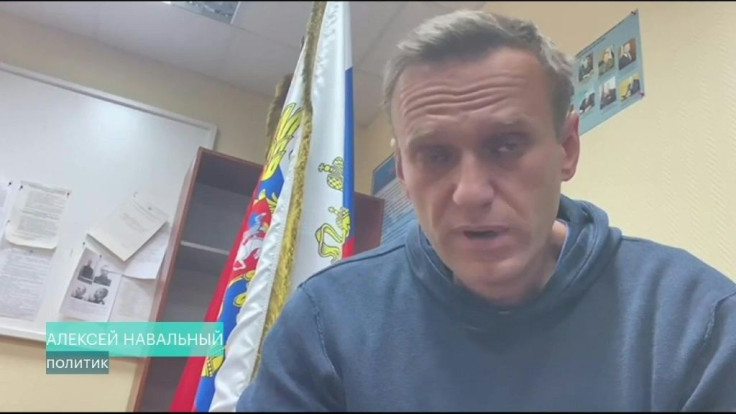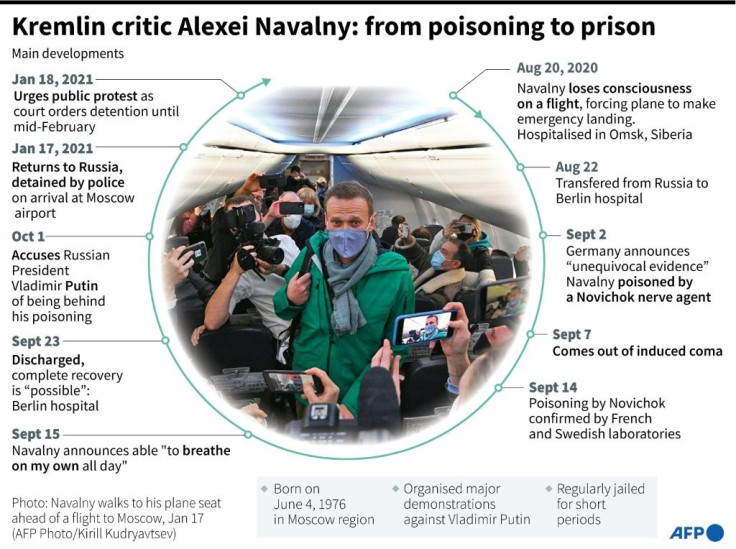Kremlin Dismisses Calls To Free Navalny, Warns Against Protests
The Kremlin on Tuesday dismissed Western demands to release Russia's most prominent opposition leader Alexei Navalny, saying his calls for mass protests over his arrest were "troubling".
Legal pressure is ramping up against President Vladimir Putin's best-known domestic critic, who is due in court on defamation charges on Wednesday, as his allies in Russia call for protests in Moscow this weekend.
Navalny, 44, was arrested on Sunday as he returned to Russia from Germany for the first time since he recovered from a near-fatal poisoning with the Soviet-designed Novichok nerve agent in August.

He hit back Tuesday with the publication of a corruption investigation into a lavish, $1.35 billion property on Russia's Black Sea coast that he alleged was owned by Putin.
In a two-hour long video accompanying the report on his blog, Navalny describes the vast estate as a "state within Russia" in which Putin is "tsar".
Russia's prison service said it had detained Navalny for violating the terms of a suspended sentence he was given in 2014 on fraud charges he says were politically motivated.

A hastily organised court on Monday ordered him jailed for 30 days, prompting associates to call on Russians to take to the streets in central Moscow and march towards the Kremlin on Saturday.
Demonstrations in Moscow have been banned due to coronavirus restrictions, but Navalny's right-hand man Leonid Volkov said Tuesday the organisers would not seek formal permission from authorities to stage the rally.
Volkov told AFP the prospect that the unauthorised rally could result in detentions for Navalny's supporters would not deter them, pointing to what he said were multiplying attacks on the opposition.
"Putin poisoned Navalny and Navalny is now behind bars," he said.

Navalny accuses Putin of ordering his poisoning, a claim the Kremlin has repeatedly denied.

The Kremlin said the calls to protest were "troubling" and stressed it would not take into account Western demands to free Navalny.
"This is absolutely a domestic affair and we will not allow anyone to interfere in it," Putin's spokesman Dmitry Peskov said.
The anti-corruption campaigner's arrest has triggered a wave of condemnation from Western countries which have called for his immediate release.
A close ally of Navalny, Vladimir Ashurkov, on Monday said he and the opposition figure had devised a list of Russian officials and public figures that Western governments should sanction to exact political change in the Kremlin.

The list published to Ashurkov's Facebook page includes Roman Abramovich, describing him as a beneficiary of "Russian kleptocracy" who owns Chelsea football club and Health Minister Mikhail Murashko, who Ashurkov said was responsible for covering up Navalny's poisoning.
"There is no foundation for such claims," a spokesperson for Abramovich said.
After an impromptu hearing on Monday at a makeshift court set up in a police station on the outskirts of Moscow, officers moved Navalny to Moscow's Matrosskaya Tishina jail, one of the country's best-guarded detention centres.
The last time mass protests took place in Moscow was in the summer of 2019 when Navalny's allies and a host of other opposition politicians were barred from balloting in local elections.
The leading Kremlin critic has repeatedly led large-scale street protests against Putin, including in 2011-2012 when tens of thousands of people took to the streets to protest widespread claims of electoral fraud in parliamentary elections.
But analysts were hard-pressed to predict a potential turnout at the Saturday demonstration, pointing to the pandemic and an increasing crackdown on Kremlin critics.
Political analyst Tatiana Stanovaya said she expected protracted opposition protests, saying: "We're on the cusp of a monumental escalation of tensions".
The prison service said it had detained Navalny for not checking in with officials twice per month during a probationary period resulting from the 2014 suspended sentence.
A court hearing is scheduled to take place on February 2 on whether he will see real prison time for the sentence of three years and six months.
Navalny was also due in court Wednesday on separate charges of defaming a World War II veteran.
The Investigative Committee, which probes major crimes, opened a probe into Navalny for libel in June for "discrediting the honour and dignity" of the veteran.
The WWII veteran had spoken out in a promotional video in favour of constitutional amendments passed last summer that allow Putin to remain in office until 2036.
Navalny posted the video on Twitter, calling the veteran and others featured in it "the shame of the country," "people without a conscience" and "traitors".
Navalny and his supporters say the case is politically motivated.
© Copyright AFP 2024. All rights reserved.





















